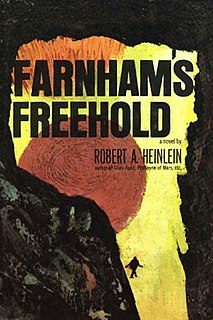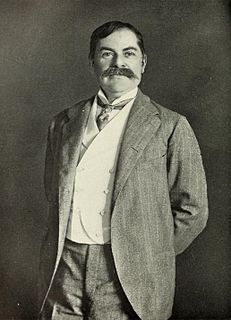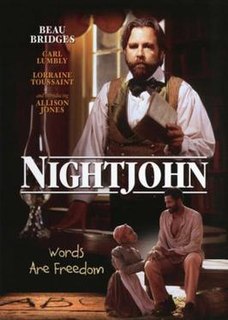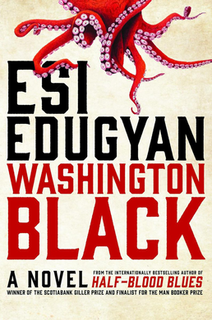The slave narrative is a type of literary genre involving the (written) autobiographical accounts of enslaved Africans, particularly in the Americas. Over six thousand such narratives are estimated to exist; about 150 narratives were published as separate books or pamphlets. In the United States during the Great Depression (1930s), more than 2,300 additional oral histories on life during slavery were collected by writers sponsored and published by the Works Progress Administration, a New Deal program. Most of the 26 audio-recorded interviews are held by the Library of Congress.

Farnham's Freehold is a science fiction novel by American writer Robert A. Heinlein. A serialised version, edited by Frederik Pohl, appeared in Worlds of If magazine. The complete version was published in novel form by G.P. Putnam later in 1964.

Absalom, Absalom! is a novel by the American author William Faulkner, first published in 1936. Taking place before, during, and after the American Civil War, it is a story about three families of the American South, with a focus on the life of Thomas Sutpen.
Gabriel, today commonly known as Gabriel Prosser, was a literate enslaved blacksmith who planned a large slave rebellion in the Richmond, Virginia area in the summer of 1800. Information regarding the revolt was leaked prior to its execution, and he and twenty-five followers were hanged.

Thomas Nelson Page was an American lawyer and writer. He also served as the U.S. ambassador to Italy from 1913 to 1919 under the administration of President Woodrow Wilson during World War I. In his writing, Page popularized the Southern tradition of the plantation genre. Page first got the public's attention with his story "Marse Chan" which was published in the Century Illustrated Magazine. Page's most notable works include The Burial of the Guns and In Ole Virginia. Page died in Oakland on November 1, 1922 aged 69.

John Brown, also known by his slave name, "Fed", was born into slavery on a plantation in Southampton County, Virginia. He is known for his memoir published in London, England in 1855, Slave Life in Georgia: A Narrative of the Life, Sufferings, and Escape of John Brown, a Fugitive Slave, Now in England. This slave narrative, dictated to a helper who wrote it, recounted his life and later escape from slavery in Georgia. He lived in London from 1850 to the end of his life, marrying an English woman.

Ruth Sophia Padel FRSL FZS is a British poet, novelist and non-fiction author, in whose work "the journey is the stepping stone to lyrical reflections on the human condition". She is known for her explorations through poetry of migration and refugees, science, and homelessness; for her involvement in wildlife conservation, Greece, and music; and for her belief that poetry "connects with every area of life" and "has a responsibility to look at the world". She is Trustee for conservation charity New Networks for Nature, has served on the board of the Zoological Society of London, and broadcasts for BBC Radio 3 and 4 on poetry, wildlife and music. In 2013 she joined King's College London, where she is Professor of Poetry.

Edmund Ruffin III was a wealthy Virginia planter who served in the Virginia Senate from 1823 to 1827. In the last three decades before the American Civil War, his pro-slavery writings received more attention than his agricultural work. Ruffin, a slaveholder, staunchly advocated states' rights and slavery, arguing for secession years before the Civil War, and became a political activist with the so-called Fire-Eaters. Ruffin is given credit for "firing the first shot of the war" at the Battle of Fort Sumter in April 1861 and fought as a Confederate soldier despite his advanced age. When the war ended in Southern defeat in 1865, he committed suicide rather than submit to "Yankee rule."
Aunt Phillis's Cabin; or, Southern Life as It Is by Mary Henderson Eastman is a plantation fiction novel, and is perhaps the most read anti-Tom novel in American literature. It was published by Lippincott, Grambo & Co. of Philadelphia in 1852 as a response to Harriet Beecher Stowe's Uncle Tom's Cabin, published earlier that year. The novel sold 20,000–30,000 copies, far less than Stowe's novel, but still a strong commercial success and bestseller. Based on her growing up in Warrenton, Virginia, of an elite planter family, Eastman portrays plantation owners and slaves as mutually respectful, kind, and happy beings.
Fred D'Aguiar is a British-Guyanese poet, novelist, and playwright. He is currently Professor of English at the University of California, Los Angeles (UCLA).
David Dabydeen is a Guyanese-born broadcaster, novelist, poet and academic. He was formerly Guyana's Ambassador to UNESCO from 1997 to 2010 and the youngest Member of the UNESCO Executive Board (1993–1997), elected by the General Council of all Member States of UNESCO. He was appointed Guyana's Ambassador Plenipotentiary and Extraordinaire to China, from 2010 to 2015. He is one of the longest serving diplomats in the history of Guyana, most of his work done in a voluntary unpaid capacity.

Kindred is a novel by American writer Octavia E. Butler that incorporates time travel and is modeled on slave narratives. First published in 1979, it is still widely popular. It has been frequently chosen as a text for community-wide reading programs and book organizations, as well as being a common choice for high school and college courses.
Dear America is a series of historical fiction novels for older children published by Scholastic starting in 1996. By 1998, the series had 12 titles with 3.5 million copies in print. The series was canceled in 2004 with its final release, Hear My Sorrow. However, it was relaunched in the fall of 2010. Each book is written in the form of a diary of a young woman's life during important events or time periods in American history. The Dear America series covers a wide range of topics, including: the Pilgrims' journey to the New World, the Salem Witch Trials, the French and Indian War, the American Revolution, the American Civil War, World War I, World War II, western expansion, slavery, immigration, nineteenth-century prairie life, the California Gold Rush of 1849, the Great Depression, Native Americans' experiences, racism, coal mining, the Triangle Shirtwaist Factory fire, the fight for women's suffrage, the sinking of the RMS Titanic, the Battle of the Alamo, the Vietnam War, and more. The breadth of historical topics covered in these books through fiction makes the Dear America series a favorite teaching device of history schoolteachers around the country. The re-launch series and releases contain a new cover style and different pictures of the main characters than those of the original releases. Originally all the books had a ribbon inserted as a bookmark for the books but were removed in the later releases. Several of the stories were filmed and released on videotape. There is also a televised adaptation that aired on Qubo.

A Book of Giants is a 1963 anthology of 13 fairy tales from Europe that have been collected and retold by Ruth Manning-Sanders. It is one in a long series of such anthologies by Manning-Sanders. It was the first anthology to receive the familiar "A Book of..." title that Manning-Sanders would become notable for.

Milton Atsushi Murayama was an American novelist and playwright. A Nisei, he wrote the 1975 novel All I Asking for Is My Body, which is considered a classic novel of the experiences of Japanese Americans in Hawaii before and during World War II.

A Picture of Freedom is a children's historical novel written by Patricia C. McKissack and published by Scholastic in 1997 as part of their Dear America series.
Frank Freeman's Barber Shop is an 1852 plantation fiction novel written by Baynard Rush Hall.

Nightjohn is a 1996 American television drama film directed by Charles Burnett and written by Bill Cain, based on the 1993 novel of the same name by Gary Paulsen. It aired on Disney Channel as one of its Premiere Films, on June 1, 1996.

The Vanishing Virginian is a 1942 American drama film directed by Frank Borzage and starring Frank Morgan and Kathryn Grayson. It is based on the memoirs of Rebecca Yancey Williams and set in Lynchburg, Virginia, from 1913 to 1929.

Washington Black is the third novel by Canadian author Esi Edugyan. The novel was published in 2018 by HarperCollins in Canada and by Knopf Publishers internationally. A bildungsroman, the story follows the early life of George Washington "Wash" Black, chronicling his escape from slavery and his subsequent adventures. The novel won the 2018 Scotiabank Giller Prize, and was shortlisted for the Booker Prize and the Rogers Writers' Trust Fiction Prize.













